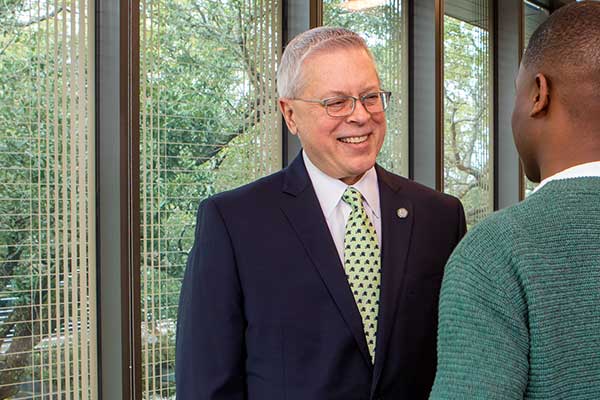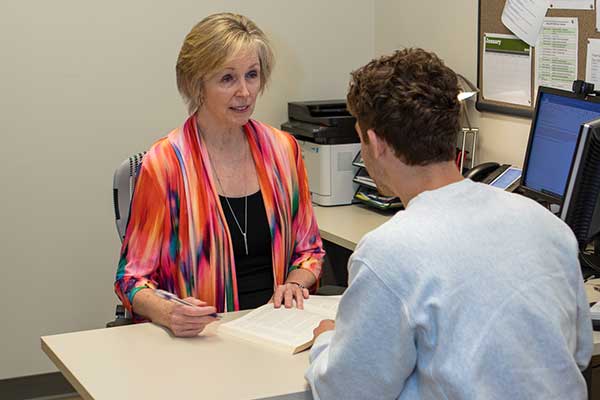
Since becoming executive director of the Career Management Center in 2017, Dale Klamfoth has worked to change the center’s focus from resume critiques and job listings to more strategic services.
Dale Klamfoth likes to tell a story about a client of his who worked on the Titanic.
Klamfoth, a senior vice president with career consulting firm DBM at the time, was working with a group of Schlumberger engineers when he asked them to think about their biggest professional accomplishments.
One of the executives was adamant that he didn’t have any accomplishments, that he just did his job, but as the conversation went on, he eventually raised his hand and asked, “What if you didn’t invent something, but you fixed it?”
The engineer explained that he had been part of a team that worked with explorer Robert Ballard to capture the first images of the wreck of the Titanic. Schlumberger, a pioneer in information technology for the offshore oil and gas industry, had provided Ballard’s crew with communications technology, but at two miles beneath the surface of the ocean, the equipment initially didn’t work. The engineer told Klamfoth that he had been the one to fix the problem. Did that count as an accomplishment?
Klamfoth paused. “Let me put it this way,” he said. “If you hadn’t fixed it, no pictures.”
The engineer nodded. “I guess you’re right.”
“By focusing on their accomplishments, people start to recognize skills they might otherwise take for granted,” explains Klamfoth, who today serves as executive director of the Freeman School’s Career Management Center. “What I see as kind of my mission in life is to help people identify and highlight those skills.”
Since 2017, Klamfoth has brought that passion for helping people reach their full potential to the Freeman School, where he leads a team of 12 CMC staff members charged with helping approximately 3,000 students achieve their professional goals. Klamfoth brings to the Freeman School more than 30 years’ experience in management, recruiting and consulting. He began his career as an auditor with PricewaterhouseCoopers before shifting into executive search at KPMG. He later spent more than 20 combined years with DBM and its successor, Lee Hecht Harrison, in multiple roles related to the firm’s Career Management, Leadership Development, Change Management and Career Transition practices, and he also served as a senior partner with Korn Ferry, the world’s largest executive search firm.
“My own career has evolved over the years, but the general themes are leadership development, executive coaching and career transition,” Klamfoth says. “I can talk about career transition and pivoting functions from personal experience. I started as an accountant, became a recruiter of accountants and finally led and coached teams of sales and business development people. I think it’s important for people to realize their skills are transferrable.”
When Dean Ira Solomon asked Klamfoth to become the center’s first executive director, he tasked him with a daunting challenge: To create a
different kind of Career Management Center.
“The landscape in which business schools have traditionally operated is changing dramatically,” Solomon says. “Technology is wiping out jobs and creating new ones, globalization is opening some doors and closing others, and students are increasingly looking for jobs with a purpose beyond a paycheck. What we want to do is build a Career Management Center that recognizes the dynamic nature of the current environment and prepares students to think strategically and long term about their professional aspirations.”
To begin that process, Klamfoth embarked on a listening tour of stakeholders, meeting with everyone who interacted with the CMC — students, faculty, alumni, staff, recruiters and vendors — to find out what the center did well and what it could do better. One of the things he discovered from those initial meetings was that he could accomplish a lot by just listening.
When Klamfoth reached out to a recruiter at a large southeastern bank with whom he’d previously worked, for example, the recruiter told him he hadn’t even known Tulane had a business school. As Klamfoth told him about the Freeman School’s programs, he mentioned Professor Gans Narayanamoorthy’s course on measuring and reporting management of risk, one of the few of its kind in the nation. The recruiter’s face lit up. The bank had just started a risk department, he told Klamfoth, and he was interested in meeting Narayanamoorthy to learn more about the class. The bank ultimately sent two associates to New Orleans to sit in
on the class, and when recruiting season came around, it hired a 2019 graduate and expressed interest in hiring more.
Klamfoth tells that story to illustrate the impact of breaking down silos and promoting communication and collaboration among stakeholders, an approach that not only helps students find jobs but also leverages the CMC’s connections to support curriculum development and build closer relationships with corporate partners. It’s the quintessential winwin scenario, and it’s part of a fundamental change in the way the CMC has historically operated.
“I call it a paradigm shift,” Klamfoth says. “We’re moving away from the transactional into the strategic.”
According to Klamfoth, the CMC has traditionally been viewed more or less like a retail store. Students would visit the center to acquire specific services, like resume assistance or job interview referrals, and that was it. One of the problems with that model is that students today are much more likely to switch jobs and change careers than they were in the past. Rather than providing students with short-lived, transactional services, Klamfoth hopes to transform the CMC into an education center that equips students with the ability to research, plan and execute job search strategies throughout their careers.
“We’re shifting from career counselors to career consultants,” Klamfoth says. “We’re helping the student make informed choices to get to that career as opposed to just critiquing resumes and posting job announcements.”

Director of Operations Carla Coury meets with a student during the CMC’s weekly drop in hours, which let students without an appointment meet with consultants.
Changing technology also comes into play. Videoconferencing platforms like Skype, GoToMeeting and Zoom enable students to interview with employers around the world from one of the CMC’s specially equipped interview suites, helping to level the playing field with candidates from bigger schools or larger markets. To help students get those interviews, the Career Management Center recently partnered with HandShake, the world’s largest career services and recruiting platform for students and recent graduates. Students can use the site to apply for jobs and internships with thousands of companies, but Klamfoth says HandShake is just a starting point.
“It’s not always the most qualified candidate who gets the job,” he says. “A lot of times, it’s the one who wants it the most. That’s why I tell students to use HandShake to find opportunities, but then to get on LinkedIn and reach out to Freeman alumni at those companies for more information. That’s how you start to differentiate yourself.”
One of the first things Klamfoth did after joining the CMC was to create a document summarizing some of the changes he hoped to bring to the center. Those initiatives included being more personal in the sense of meeting students where they are and treating them as individuals, being more positive in the sense of supporting and reinforcing students’ skills and abilities, being more proactive in the sense of initiating contact with students and employers, and being more permanent in the sense of providing students with access to career-related services throughout their careers.
Klamfoth has already begun integrating “the four Ps” into Career Development & Management, the undergraduate career skills course taught by CMC staff members, and he’s incorporating those principles into career education initiatives for graduate students as well. In keeping with Dean Solomon’s directive, these new offerings focus less on resume critiques and more on helping students to identify and pursue the opportunities that best support their career aspirations.
“We need to focus on making sure that the student gets not just a job but the right job,” Klamfoth says. “That’s what’s dangerous about a brokered kind of relationship. If we focus solely on transactional activities, like setting up job interviews, we’re not fulfilling an even more important role — helping to make sure that students connect with organizations that truly fit their long-term goals.
Michael Rosen (BSM ’19) is a good example. During an on-campus with Ameriprise Financial, Rosen struggled to explain to his recruiter why he wanted to work at the company. When he finally met with Klamfoth, he realized it was because his passion wasn’t necessarily in finance. It was in technology. With the help of Klamfoth and CMC staff, Rosen refocused his efforts on technology-related companies, which led to an offer from Rapid7, a cybersecurity firm based in Massachusetts.
“Instead of just reviewing my resume and saying, ‘Okay, here are 10 companies that might be of interest to you,’ Dale really pushed me to do the work, which was a good thing,” Rosen says. “Identifying jobs of interest really helped me once I reached the interview stage, because I was able to differentiate myself by showing real enthusiasm for the opportunity.”
Klamfoth is hoping for more stories like Rosen’s as he and his staff spend more time with students earlier in their job search processes, helping them to identify career interests with greater precision and then translate those interests into targeted searches that yield better, more rewarding jobs.
“Mastering anything takes practice, but most of us just don’t look for a job frequently enough to get really good at it,” Klamfoth says. “That’s where the CMC can help: We can teach you the skills necessary to find the right job and help you practice until you’ve mastered them. The more we can spread that message, the better our outcomes are going to be for students in terms of both the quantity and quality of job offers.”
2019 TOP 10 EMPLOYERS
(BSM PROGRAM)
EY
Deloitte
KPMG
PwC
JP Morgan
Wells Fargo
Credit Suisse
Deutsche Bank
AlphaSights
Accenture
Ranked by number of students accepting jobs.
2019 SELECTED EMPLOYERS
(MBA PROGRAM)
Alliant Group
Baker Botts
Cross Stream LLC
Dell EMC
Dell Technologies Inc.
General Dynamics
Healthcare Corp. of America
Houston Area Safety Council
Jenny Craig
Mercer LLC
Ochsner Health Care
Orange Bowl
Strathspey Crown
Vinson & Elkins
Listed alphabetically
2019 BSM EMPLOYMENT OUTCOMES
Percent Employed
95%
Median Salary
$59,000
Mean Salary
$58,208
as of Sept. 30, 2019
2019 MBA EMPLOYMENT OUTCOMES
Percent Employed
76%
Median Salary
$100,000
Mean Salary
$102,320
three months after graduation
